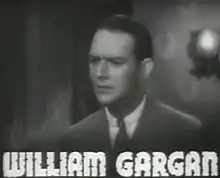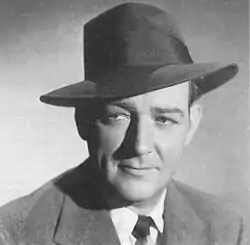William Gargan
William Dennis Gargan (July 17, 1905 – February 17, 1979) was an American film, television and radio actor. He was the 5th recipient of the Screen Actors Guild Lifetime Achievement Award in 1967,[1] and in 1941, was nominated for the Academy Award for Best Supporting Actor for his role as Joe in They Knew What They Wanted. He acted in decades of movies including parts in Follow the Leader, Rain, Night Flight, Three Sons, Isle of Destiny and many others. The role he was best known for was that of a private detective Martin Kane in the 1949–1952 radio-television series Martin Kane, Private Eye. In television, he was also in 39 episodes of The New Adventures of Martin Kane.
William Dennis Gargan | |
|---|---|
 | |
| Born | July 17, 1905 Brooklyn, New York, U.S. |
| Died | February 17, 1979 (aged 73) Died in flight between New York City and San Diego |
| Resting place | Holy Cross Cemetery (San Diego), California |
| Years active | 1925–1958 |
| Spouse(s) | Mary Kenny
(m. 1928; |
Early years
Gargan was born in Brooklyn, New York. He was the younger brother of actor Edward Gargan, whose birthday July 17 he shared. His father was a detective, and his mother was a teacher. He graduated from St. James School in Brooklyn.[2]
On leaving school, Gargan became a salesman of bootleg whiskey to New York speakeasies and then joined a detective agency.
Stage
While visiting his brother on a musical comedy stage, he was offered a stage job which he accepted. He began his stage career in Aloma of the South Seas.[2]
Film
Gargan's first film was Rain.[2] Later, he played in Misleading Lady and had character roles in many Hollywood productions, including starring in three films as detective Ellery Queen.
He was cast in a number of stereotypical Irish parts in films playing policemen, priests, reporters, and blustering adventurers. In 1945, he played Joe Gallagher in The Bells of St. Mary's, starring Bing Crosby and Ingrid Bergman.
In 1935, Gargan went to England and made several films.[2]
In 1940, Gargan was nominated for the Academy Award for Best Supporting Actor for his role as Joe, the foreman, in They Knew What They Wanted.[3]
Radio and television

Gargan was best known for his role as private detective Martin Kane in the 1949–1952 radio-television series Martin Kane, Private Eye,[4]:219 sponsored by U.S. Tobacco. He also appeared in the title role as a private detective in the NBC radio show Barrie Craig, Confidential Investigator, which ran from 1951 to 1955.[4] He also portrayed Ross Dolan in I Deal in Crime,[4]:159, Inspector Burke in Murder Will Out,[4]:214-242 and Captain Flagg in Captain Flagg and Sergeant Quirt,[4]:63 and was host of G. I. Laffs[5]
On television, Gargan starred in 39 episodes of Martin Kane, Private Eye, which ran on NBC from 1949 to 1954 and was syndicated in 1957-1958[6] and on The New Adventures of Martin Kane, which ran on NBC in 1953-54.[6]:751
Later years
Gargan's acting career came to an end in 1958 when he developed throat cancer, and doctors were forced to remove his larynx in 1960.[7] Speaking through an artificial voice box, Gargan became an activist and spokesman for the American Cancer Society, often warning about the dangers of smoking.[8] In 1965, Mutual of Omaha presented its annual Criss Award to Gargan for "his inspirational self-rehabilitation efforts and his outstanding contributions to established rehabilitation programs."[9]
No longer able to act, he formed William Gargan Productions, making traditional films and television films in Hollywood.[10]
Family
Gargan and his wife, Mary, had two sons, Leslie and Barrie.[11]
Death
He died of heart attack aged 73 on February 17, 1979 on a flight between New York City and San Diego. He was buried at Holy Cross Cemetery in San Diego, California.
Partial filmography
- Lucky Boy (1928) – bit part (uncredited)
- Follow the Leader (1930) – a gangster
- His Woman (1931) – (uncredited)
- Partners (1931, short)
- Misleading Lady (1932) – Fitzpatrick
- Rain (1932) – Sergeant O'Hara
- The Sport Parade (1932) – Johnny Baker
- The Animal Kingdom (1932) – 'Red' Regan
- Lucky Devils (1933) – Bob Hughes
- Sweepings (1933) – Gene Pardway
- The Story of Temple Drake (1933) – Stephen Benbow
- Emergency Call (1933) – Steve Brennan
- Headline Shooter (1933) – Bill Allen
- Night Flight (1933) – Brazilian pilot
- Aggie Appleby Maker of Men (1933) – Red Branahan
- Four Frightened People (1934) – Stewart Corder
- The Line-Up (1934) – Bob Curtis
- Strictly Dynamite (1934) – George Ross
- British Agent (1934) – Bob Medill
- A Night at the Ritz (1935) – Duke Regan
- Traveling Saleslady (1935) – Pat O'Connor
- Black Fury (1935) – Slim
- Don't Bet on Blondes (1935)
- Bright Lights (1935) – Dan Wheeler
- Broadway Gondolier (1935) – Cliff Stanley
- Things Are Looking Up (1935) – Van Gaard
- Man Hunt (1936) – Hank Dawson
- The Milky Way (1936) – Speed McFarland
- The Sky Parade (1936) – Speed Robertson
- Mariners of the Sky/Navy Born (1936) – Lt. Red Furness
- Blackmailer (1936) – Peter Cornish
- Alibi for Murder (1936) – Perry Travis
- Fury and the Woman (1936) – Bruce Corrigan
- Flying Hostess (1936) – Hal Cunningham
- You Only Live Once (1937) – Father Dolan
- Breezing Home (1937) – Steve Rowan
- Wings Over Honolulu (1937) – Lieutenant Jack Furness
- Reported Missing (1937) – Steve Browning
- She Asked for It (1937) – Dwight Stanford
- Behind the Mike (1937) – George Hayes
- Some Blondes Are Dangerous (1937) – George Regan
- You're a Sweetheart (1937) – Fred Edwards
- The Crime of Doctor Hallet (1938) – Dr. Jack Murray
- The Devil's Party (1938) – Mike O'Mara
- The Crowd Roars (1938) – Johnny Martin
- Personal Secretary (1938) – Marcus 'Mark' Farrell
- Within the Law (1939) – Cassidy
- The Adventures of Jane Arden (1939) – Ed Towers
- Broadway Serenade (1939) – Bill
- Women in the Wind (1939) – Ace Boreman
- The House of Fear (1939) – Arthur McHugh
- Three Sons (1939) – Thane Pardway
- The Housekeeper's Daughter (1939) – Ed O'Malley
- Joe and Ethel Turp Call on the President (1939) – Joe Turp
- Double Alibi (1940) – Walter Gifford
- Isle of Destiny (1940) – 'Stripes' Thornton
- Star Dust (1940) – Dane Wharton
- Turnabout (1940) – Joel Clare
- Sporting Blood (1940) – Duffy
- They Knew What They Wanted (1940, Nominated – Academy Award for Best Supporting Actor) – Joe
- Cheers for Miss Bishop (1941) – Sam Peters
- Flying Cadets (1941) – 'Trip' Hammer
- I Wake Up Screaming (1941) – Jerry MacDonald
- Keep 'Em Flying (1941) – Craig Morrison
- Sealed Lips (1942) – Lee Davis
- Bombay Clipper (1942) – James Montgomery 'Jim' Wilson
- A Close Call for Ellery Queen (1942) – Ellery Queen
- A Desperate Chance for Ellery Queen (1942) – Ellery Queen
- Miss Annie Rooney (1942) – Tim Rooney
- The Mayor of 44th Street (1942) – Tommy Fallon
- Enemy Agents Meet Ellery Queen (1942) – Ellery Queen
- Destination Unknown (1942) – Briggs Hannon – aka Terry Jordan
- Who Done It? (1942) – Police Lt. Lou Moran
- No Place for a Lady (1943) – Jess Arno
- Harrigan's Kid (1943) – Tom Harrigan
- Swing Fever (1943) – 'Waltzy' Malone
- The Canterville Ghost (1944) – Sergeant Benson
- She Gets Her Man (1945) – 'Breezy' Barton
- Song of the Sarong (1945) – Drew Allen
- Midnight Manhunt (1945) – Pete Willis
- The Bells of St. Mary's (1945) – Joe Gallagher, Patsy's father
- Follow That Woman (1945) – Sam Boone
- Behind Green Lights (1946) – Lt. Sam Carson
- Strange Impersonation (1946) – Dr. Stephen Lindstrom
- Night Editor (1946) – Police Lt. Tony Cochrane
- Murder in the Music Hall (1946) – Inspector Wilson
- Rendezvous 24 (1946) – Agent Larry Cameron
- Hot Cargo (1946) – Joe Harkness
- Till the End of Time (1946) – Sgt. Gunny Watrous
- Swell Guy (1946) – Martin Duncan
- The Argyle Secrets (1948) – Harry Mitchell
- Waterfront at Midnight (1948) – Mike Hanrohan
- Dynamite (1949) – 'Gunner' Peterson
- Miracle in the Rain (1956) – Harry Wood
- The Rawhide Years (1956) – Marshal Sommers
Radio appearances
| Year | Program | Episode/source |
|---|---|---|
| 1943 | Philip Morris Playhouse | Roberta[12] |
Book
Gargan's autobiography Why Me? was published by Doubleday in 1969.[13] A reviewer described the book as "a compelling story of the life, faith and courage of a man who as an actor was a notable success."[14]
References
- "5th | Screen Actors Guild Awards". www.sagawards.org.
- "Radio-Television". Altoona Tribune. March 25, 1952. p. 13. Retrieved July 6, 2015 – via Newspapers.com.

- "William Gargan". oscars.org. Retrieved 7 July 2015.
- Terrace, Vincent (1999). Radio Programs, 1924-1984: A Catalog of More Than 1800 Shows. McFarland & Company, Inc. pp. 33–34. ISBN 978-0-7864-4513-4.
- Dunning, John (1998). On the Air: The Encyclopedia of Old-Time Radio (Revised ed.). New York, NY: Oxford University Press. p. 282. ISBN 978-0-19-507678-3.
- Terrace, Vincent (2011). Encyclopedia of Television Shows, 1925 through 2010 (2nd ed.). Jefferson, N.C.: McFarland & Company, Inc., Publishers. pp. 659–660. ISBN 978-0-7864-6477-7.
- "Cancer Society to Hear Actor William Gargan". The Bakersfield Californian. September 11, 1962. p. 36. Retrieved July 6, 2015 – via Newspapers.com.

- Reinehr, Robert C. & Swartz, Jon D. (2010). The A to Z of Old Time Radio. Scarecrow Press. p. 107. ISBN 9781461672074.
- "William Gargan, Actor, Will Get 8th Criss Award". The Lincoln Star. September 14, 1965. p. 3. Retrieved July 7, 2015 – via Newspapers.com.

- Swinford, T. William (March 12, 1964). "Suburbs Beat Hollywood – for Family Life". Arlington Heights Herald. p. 19. Retrieved July 6, 2015 – via Newspapers.com.

- "Gargan's Family Ill". The Brooklyn Daily Eagle. September 21, 1938. p. 1. Retrieved July 6, 2015 – via Newspapers.com.

- "Air Ya Listenin?". The Mason City Globe-Gazette. May 14, 1943. p. 2. Retrieved July 21, 2015 – via Newspapers.com.

- Gargan, William (1969). Why me?; an autobiography. OCLC 794.
- McLeod, Edyth Thornton (June 10, 1969). "Beauty After Forty". Lubbock Avalanche-Journal. p. 25. Retrieved July 7, 2015 – via Newspapers.com.

External links
| Wikimedia Commons has media related to William Gargan. |